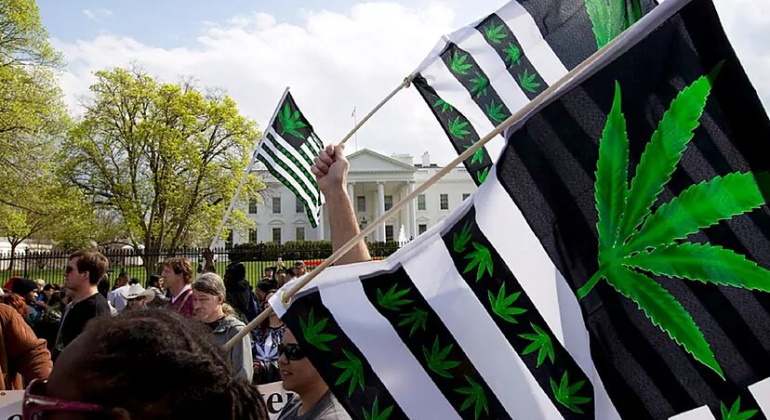The stock market euphoria and subsequent crisis in the cannabis industry is a story that seems to have no end. As the different chants of legalization in the US and Europe have been heard over the last decade, industry companies have soared only to crash when it did not materialize. However, now the sector is stepping on the accelerator and, with Germany already having landed its cannabis law, they believe more than ever that Biden will save the sector by removing this product as one of the most dangerous drugs for the Department of Health and the DEA. Thanks to this possibility – no doubt a brazenly political move on Biden’s part to secure the stoner vote ahead of November’s election – values of more than 100% have already skyrocketed on the stock market this year.
The largest US company, Curaleaf, has surged 38% so far this year. However, other national companies like Truelieve are up 112%, followed by others like Cresco (+60%) or Green Thumb (+15%). However, Canadian marijuana giants stand out, with increases of 103% for Canopy Group, 40% for Aurora, and 25% for Cronos, who see their southern neighbor as their great expansion hope. The national sector as a whole, represented in the Pure US Cannabis ETF, the largest in the sector, is experiencing increases of over 30% in 2024 and is already up 75% from its November 2023 lows, when the sector was in one of its worst moments.
The legal situation in the US is somewhat strange. On the one hand, each state has been able to regulate its use on its own, which has led to widespread approval. States like California, New York are just two of the 24 states where its use for recreational purposes is allowed. Adding those that accept it for therapeutic use, the number increases to 38 states. The problem, beyond local markets, is that without a federal law, there are significant restrictions on growth and, especially, numerous operational business issues.
An example of this is that the US banking system is completely closed to these types of companies and it is extremely difficult to find institutional investors. Political uncertainty is poison for the business, and something as simple as renting a field to grow requires intermediaries that critically raise prices. “Banks and other financial institutions often refuse to do business with cannabis companies and obtaining simple insurance is really complicated and costly,” explain the RCCB experts.
In recent years, this major regulatory issue has been compounded by higher costs that have increased margins (due to supply crises, the war in Ukraine, and inflation) while a high-interest rate environment has damaged profits. This has caused profitability to plummet with no sign of improvement, and in fact, the latest report from Whitney Economics shows that only 25% of firms are profitable compared to 40% in 2022 and previous years. “Their costs have risen, there is strong competition and growth issues while they bear enormous risk because they do not have access to common business protections (such as insurance) and there are hundreds of legal factors that are beyond their control.”
This is why a change in regulation is so important, and the possibility of total regulation is gaining strength, an option that seemed to gain momentum with Biden’s arrival at the White House, but was soon frustrated by a lack of political will. Several authorities have already confirmed that a complete law could soon be seen in response to a reclassification of this drug. The first to raise the alarm was the Vice President, Kamala Harris, who argued in a roundtable in March that “current federal restrictions are totally absurd, where this drug is considered as dangerous as heroin and fentanyl, something totally unfair.”
The Democrat’s comments seemed to be a mere anecdote, but a few days later, the Health Department recommended classifying cannabis as part of ‘list 3’ of drugs, that is, to be part of current medical use substances. It is currently on ‘list 1’, that is, the most dangerous act list. However, it was in April and May when marijuana stocks critically accelerated with Biden entering the scene.

The US President has insisted during this year in various speeches (especially in the State of the Union debate) on the need to “decriminalize this substance” stating that “I will instruct my cabinet to review the Federal classification of marijuana.” These words, which the market had already become accustomed to, seem to be turning into facts this May, after the drug enforcement agency, the DEA, is preparing an official reclassification of cannabis to place it among the least dangerous drugs, according to Associated Press.
This measure falls short of the hopes that companies had initially with Biden, as they thought a law that completely decriminalized it could come. However, this regulatory change would be a before and after for the sector, as the national administration would stop penalizing trade by law, a situation that has generated enormous uncertainty among investors, entrepreneurs, and consumers and would open the industry wide to a safe environment for growth.
Hand in hand with this ‘revolution’ in the world’s largest market, another important catalyst has also emerged. Since April, the consumption of cannabis in Germany has been legalized, allowing adults to consume the substance for recreational purposes, and ‘social clubs’ will be able to distribute and cultivate the drug as long as it is nonprofit. Although the new regulation does not leave room for total commercialization, it represents a new reason for hope for the sector, which can also look to Europe as a possible land of opportunities.


